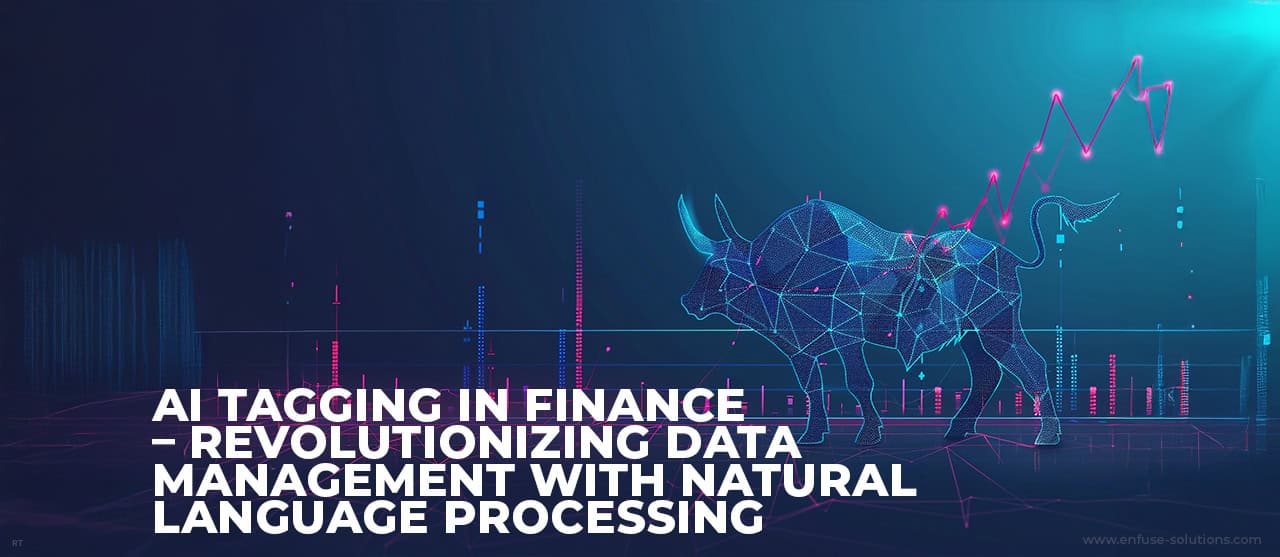
In the fast-paced world of finance, accurate and efficient data management is crucial for decision-making and strategic planning. The advent of Artificial Intelligence (AI) has brought significant advancements in how financial data is processed and analyzed. Among these advancements, AI tagging has emerged as a powerful tool, enabling the extraction of relevant information from vast amounts of unstructured data.
This blog explores how AI is being used to tag financial data, with a particular focus on the role of Natural Language Processing (NLP) in extracting valuable insights from financial reports and news articles.
Understanding AI Tagging
AI tagging involves the use of algorithms to label or categorize data automatically. In finance, this means assigning relevant tags to pieces of information, making it easier to organize, retrieve, and analyze data. Tags can include entities such as company names, financial metrics, dates, and specific events. By automating this process, AI reduces the time and effort required for manual tagging, enhancing the accuracy and efficiency of data management.
The Role Of Natural Language Processing (NLP)
Natural Language Processing, a subfield of AI, focuses on the interaction between computers and human language. NLP techniques enable machines to understand, interpret, and generate human language in a valuable way. In the context of financial data, NLP plays a critical role in extracting meaningful information from textual content such as financial reports, news articles, earnings calls, and analyst notes.
Key Applications Of NLP In Financial Data Tagging
1. Financial Reports Analysis
Financial reports are rich sources of information, but they are often lengthy and complex. NLP algorithms can scan these reports, identify key financial metrics (e.g., revenue, profit, expenses), and tag them accordingly. This automated process not only saves time but also ensures that critical data points are accurately captured for further analysis.
2. News Article Tagging
Financial news articles provide real-time updates on market trends, company performance, and economic events. NLP can be used to analyze these articles, extracting relevant entities such as company names, stock symbols, and market events. By tagging this information, NLP helps in monitoring market sentiment and identifying potential investment opportunities.
3. Sentiment Analysis
Sentiment analysis, a popular NLP application, involves determining the sentiment expressed in a piece of text. In finance, sentiment analysis can be applied to news articles, social media posts, and analyst reports to gauge market sentiment towards a particular stock or the overall market. This tagged sentiment data can then inform trading strategies and risk management decisions.
4. Earnings Call Transcripts
Earnings calls provide valuable insights into a company’s performance and prospects. NLP can be employed to transcribe and analyze these calls, tagging mentions of key financial metrics, strategic initiatives, and market conditions. This enables analysts to quickly access and review critical information without having to listen to entire calls.
Benefits Of AI Tagging In Finance
- Efficiency: Automating the tagging process significantly reduces the time required to process large volumes of financial data, allowing analysts to focus on higher-value tasks.
- Accuracy: AI algorithms can consistently apply tagging rules, minimizing human error and ensuring that data is accurately categorized.
- Scalability: AI tagging systems can handle vast amounts of data, making it easier for financial institutions to scale their data management operations.
- Real-Time Analysis: With the ability to process data in real-time, AI tagging enables timely decision-making and enhances the responsiveness of financial strategies.
Challenges And Future Directions
While AI tagging and NLP offer numerous benefits, there are also challenges to consider. Ensuring the quality and reliability of tagged data, dealing with ambiguities in language, and maintaining up-to-date models are ongoing concerns. However, advancements in machine learning and AI continue to address these challenges, paving the way for even more sophisticated applications in the future.
As AI technology evolves, the integration of AI tagging in finance will likely become more seamless and pervasive. Financial institutions that embrace these innovations will be better positioned to manage their data effectively, gain deeper insights, and maintain a competitive edge in the dynamic financial landscape.
EnFuse Solutions offers cutting-edge AI-driven tagging services, enhancing accuracy and efficiency for businesses in managing their digital assets effectively. Reach out today for advanced AI & ML enablement services!

















Comment